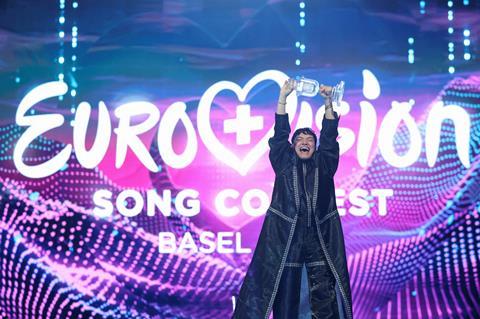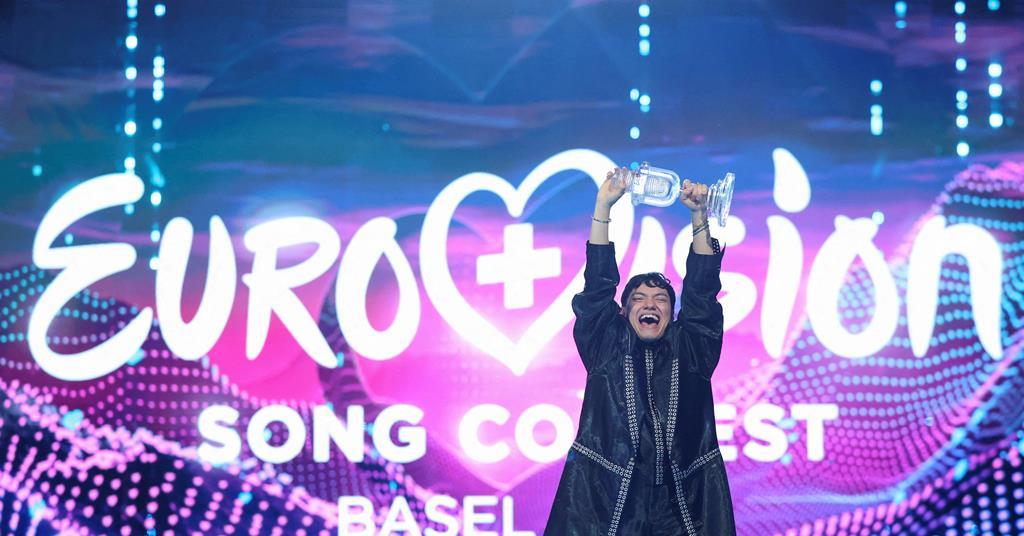Premier Christianity uses cookies Read our cookie policy.
By 2025-05-19T09:37:00+01:00
Eurovision broadcaster and Methodist preacher, Lisa-Jayne Lewis says the song contest is about far more than just glitter and spectacle. It’s an encounter with something bigger, and it’s packed full with sacred possibilities 
Source: REUTERS
JJ, representing Austria with ‘Wasted Love’, was victorious at the 2025 Eurovision Song Contest in Basel, Switzerland
Did you, like eight million other viewers in the UK, tune into BBC One on Saturday night to watch the Eurovision Song Contest?
Maybe you watched with friends, maybe you dipped in between cups of tea, or maybe you only caught the voting — but chances are, you saw at least some of it.
What you saw was a spectacle: 26 acts from across Europe (and beyond) – 37 if you count the semi finals, singing under blazing lights, with everything from drag queens to folklore to lasers and pyros. What you might not have seen is the other story — the one that unfolds behind the glitter. A story of people.
As a Eurovision broadcaster and commentator with over a decade of experience, and also a Methodist local preacher, I live in both those worlds — music and ministry, sequins and scripture. And what I’ve discovered is that faith and Eurovision have more in common than you might think.
Because while the contest is officially apolitical and non-religious, it’s also deeply human. And humans don’t live in a bubble and neither does Eurovision. We carry our politics, our cultures, and yes — our faith — with us wherever we go. Maybe even into the world of Eurovision.
Each May, thousands of people pack their flags and hopes into suitcases and travel across Europe to gather for the Eurovision Song Contest. On the surface, it’s just a televised music competition — but speak to anyone who’s been involved for more than a passing year, and you’ll hear it described in strikingly spiritual terms: “life-changing,” “sacred,” “a homecoming,” “finding my tribe.”
In many ways, it’s a kind of secular pilgrimage. There are rituals — the national final season, the allocation draw, the pre-parties, visiting former venues. There are sacred objects — laminated accreditations, the host city key ring insignia, national flags and scarves. There are gathering points — EuroClub, Euro Village, in Basel there is a Eurovision Square, and of course the arena — where people reunite with friends made in Kyiv, Torino, Liverpool or another far flung corner of the continent. Some attend year after year, regardless of whether their country is in or out. Others save for a lifetime to go just once.
But beyond the glitter, there’s something deeper that calls people back. Eurovision is a celebration of humanity — in all its messiness, creativity, and challenges. It offers a space where people can be fully themselves, sometimes for the first time. It’s about belonging. It’s about being seen. And at its most profound, it becomes a space of transformation — the same kind of transformation people have always sought on pilgrimage.
No one’s preaching. But that doesn’t mean faith isn’t alive and visible
As someone who knows both the buzz of backstage and the stillness of a Sunday service, I see the similarities clearly. Pilgrimage is not necessarily about geography; it’s far more about encounter. Encounter with one another. Encounter with something bigger. Eurovision, despite its non-religious status, is often filled with those moments.
Eurovision may be officially non-religious, but the people who make it happen are not. In the arena, backstage, in dressing rooms and delegations, and in the media centre and the audience — faith is present because people of faith are present.
Muslims, Jews, and Christians (in all their expressions) are part of the Eurovision family — as artists, dancers, broadcasters, technicians, and fans. I’ve prayed with friends and colleagues in the media centre, seen artists quietly cross themselves before stepping on stage, had conversations about faith with Azerbaijani Muslim friends and visited the Western Wall in Jerusalem with Israeli journalist friends.
No one’s preaching. No one’s converting. But that doesn’t mean faith isn’t alive and visible. It’s part of the human mix — a quiet presence, woven into the fabric of this colourful, global community.
Each year, a new Eurovision stage rises from nothing — rigged with light, screens, and possibilities. It’s a technological marvel, but more than that, it becomes a platform where something profoundly human can unfold. For three minutes at a time, artists are given a rare gift: the world’s attention. And in that space, something sacred often breaks through.
I’ve stood just feet away from performances that changed the atmosphere in the room. Jamala’s ‘1944’ (Ukraine 2016) was one of them — raw, historical, painful, prophetic. You could feel the stillness fall over the audience, a kind of reverence, like holding your breath in a cathedral. Or Marija Šerifović’s ‘Molitva’ (Serbia 2007), a stirring, string-driven ballad that captures raw emotion and quiet strength. And then there are the moments of joy and catharsis — not shallow, but defiantly life-affirming, like Käärijä’s riot of colour in ‘Cha Cha Cha’ (Finland 2023) and The Roop’s infectious energy in ‘Discoteque’ (Lithuania 2021).
These aren’t just songs. They’re confessions, laments and celebrations. Some artists bring their culture, others bring their politics, others bring their trauma or their joy — and in doing so, they open an open, welcoming space that feels remarkably like the kind we try to create in our churches.
I’ve come to believe that the Divine isn’t fussy about where holiness happens. A chapel, a living room, a Eurovision bubble — all are fair ground. The sacred shows up where truth is spoken, where vulnerability is offered, where humanity is honoured. And when that happens something greater than us is present, even if it’s never named.
Strip away the costumes, the cameras, the commentary — and like all of us, I’m just a person, trying to live with integrity and hope. Or as Singer-songwriter Lucio Corsi (Italy 2025) puts it in his song from Saturday night “non sono altro che Lucio” — I am nothing more than Lucio.
Grab this Deal!
We’re celebrating a remarkable journey from our humble beginnings as Buzz in the 1960s to the vibrant, multi-platform publication we are today. One thing has remained constant: our commitment to connecting faith with the world around us. To celebrate our birthday, we are offering you a Print and Digital subscription for just £24 your first 12 months!
Subscribe Today
*Offer applies in UK only, but check here for our overseas offers
2025-11-14T16:26:00Z
As Gaza’s fragile ceasefire hangs by a thread, the territory’s 1,000 Christians – many of whom have spent two years sheltering in bombed churches – must decide whether to flee to safety or stay in the land where Christianity was born
2025-11-14T15:56:00Z
One man’s desperate search for healing leads him to investigate miraculous claims with scientific rigour in Angel’s new streaming series Miracle. It’s compelling viewing, says Tim Bechervaise, but Bear Grylls’ contribution feels shoehorned in
2025-11-14T13:44:00Z
Nicola Olyslagers reveals how putting God at the centre of her life transformed both her athletics career and her sense of purpose, leading to record-breaking performances and a ministry among fellow athletes
2025-11-18T14:01:00Z
Bible Society researcher Dr Rob Barward-Symmons hits back at claims made by Tim Wyatt that new Church of England attendance figures discredit the much talked about Quiet Revival report
2025-11-13T12:03:00Z
Christian meditation is nothing to be afraid of. In fact contemplative and silent prayer is the most consistently emphasised aspect of Jesus’ own prayer life, argues Chris Whittington. The future of Christianity will not be louder, but quieter and deeper
2025-11-12T15:29:00Z
The departure of the BBC’s director general and news CEO raise questions about the difference between political gesture and making amends, says George Pitcher. The Christian concept of penance has much to offer
Site powered by Webvision Cloud

